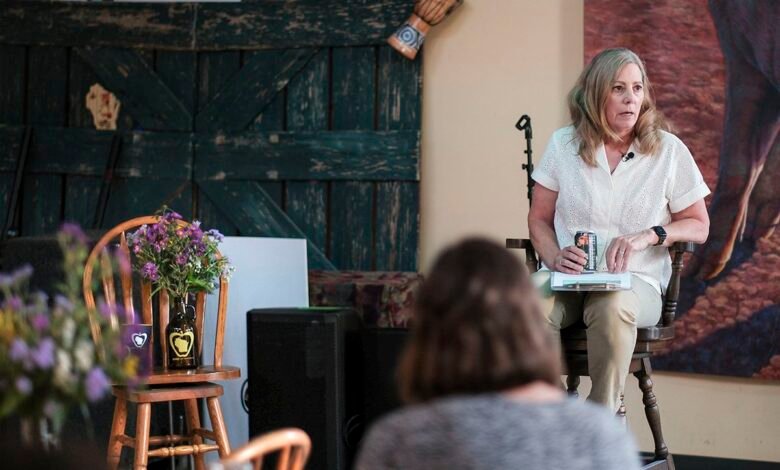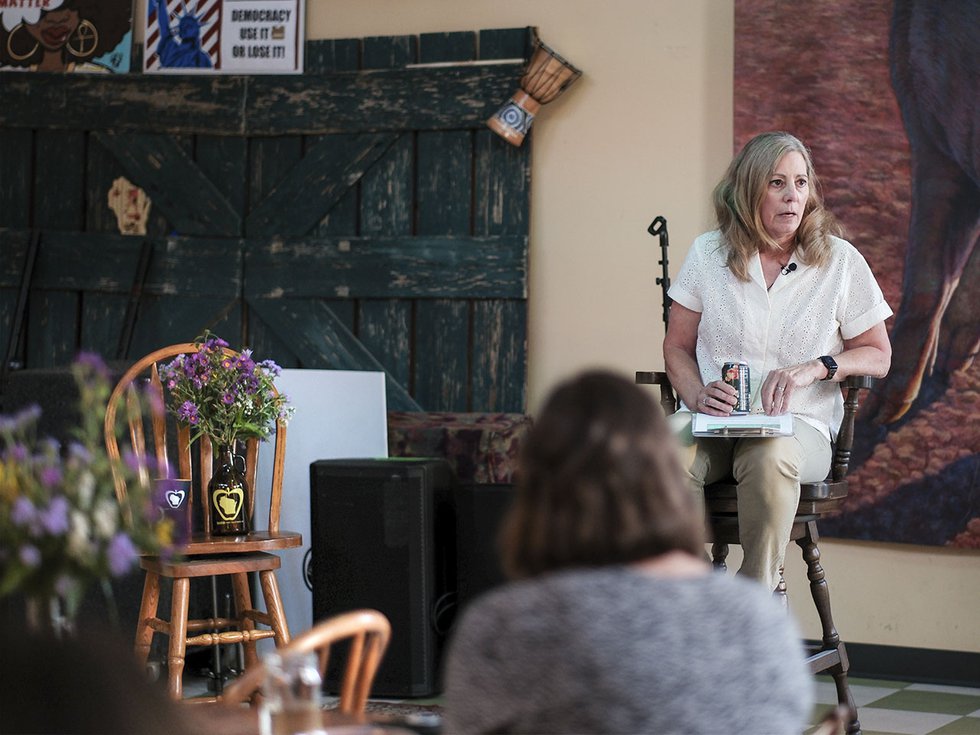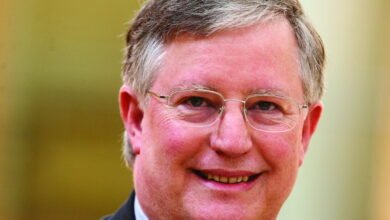In Mount Horeb, incumbent Republican Rep. Todd Novak passes on debate – Isthmus


Elizabeth Grabe, a Democrat running for one of Wisconsin’s newly competitive state Assembly seats, sat on a stage at Mount Horeb’s Brix Cider for about 45 minutes answering questions during a candidate forum hosted by the Main Street Alliance, a group that champions small business owners. The chair next to her sat empty, save for a cup and bouquet of flowers.
“Representative Novak, any comment?,” Corrine Hendrickson, the event’s emcee, said in a joking manner after Grabe had finished answering a question about Wisconsin’s farm consolidations.
Rep. Todd Novak, the five-term Republican incumbent representing Assembly District 51, was invited to the Sept. 16 forum but did not attend. Shawn Phetteplace, campaigns director for Main Street Alliance, says his group tried its best to accommodate Novak and offered a range of dates and times. An aide to Novak eventually told Phetteplace that Novak was “unavailable.”
Hendrickson has never hosted such a forum. She tells Isthmus she was motivated to take the reins because she wants candidates to be more responsive to their constituents, especially given that Wisconsin’s legislative maps were redrawn in February. That redistricting process moved Mount Horeb into Novak’s district and he’s fighting to keep his seat. Novak declined to participate in forums in past elections and despite this year’s tighter race, he is not changing his tune.
“I feel like [Novak] should be here,” says Hendrickson, a Main Street Alliance member. “To me, that says that he doesn’t care what his constituents have to say, is scared of his constituents asking hard questions. I really would like to know more why he stays away from these types of forums.”
Marie Raboin, a Main Street Alliance member and the owner of Brix Cider, where the forum was held, says she personally sent Novak’s campaign an email to encourage his attendance at the forum after the official invitation was sent. “Our food is all sourced locally, from local farms, and most of the farms I source my food from are in his district,” Raboin says. “I sent him an email, and I said, ‘Hey, we’re doing this thing. A bunch of the farms I sourced [the event’s food] from are actually in your district. It’d be really great if you wanted to come.’”
Novak did not respond to her email, she says. Novak also did not respond to an interview request from Isthmus.
After the event, Grabe says in an interview that she was disappointed that Novak did not attend: “I am aware of the interview you had with Todd, where he said that his campaign manager or staff was not on board with him being here, but I feel like we need to know both sides of the story,” Grabe says.
It has become more common for candidates to refuse to participate in forums over the last decade, according to Eileen Newcomer, voter education manager for the League of Women Voters-Wisconsin, a nonpartisan voter outreach organization. She says that state-level candidate forums remain “bread and butter” work for local League chapters. But now sometimes candidates don’t even respond to invites.
“Oftentimes we don’t even get the benefit of a ‘no’. They just ignore us,” Newcomer says. “We do try to contact the candidates multiple times, multiple ways: phone calls, emails, even with certified mail. Sometimes the certified mail gets returned saying they couldn’t deliver it, because the person didn’t want to receive it.”
When someone declines to attend, Newcomer says League chapters make efforts to work with them to understand why and if a solution can be found. Frequent refusals to participate in forums have forced the League to shift its operations, Newcomer says. Now it spends more time on their voters guide and recording digital candidate interviews, so there’s less reliance on candidates’ schedules.
But if there are no opportunities for in-person engagement, voters are unable to challenge candidates on the spot — Newcomer likens a candidate forum to a job interview held by voters. And that means that voters, particularly those who are younger, feel less connected to their representatives.
Newcomer, who is in her early 30s, recalls her boss telling her that when she moved from Appleton to Madison she immediately introduced herself to her local representative. It’s a thought that, as a younger person, never crossed her mind.
“And I’m sure that there’s a lot of younger people that don’t think that the people who represent them are approachable, because they’re not out in the public. They’re not showing voters that they want to be connected to them,” Newcomer says. “Or people make phone calls and then they get [that] the voicemail or the inbox is full, and nobody ever responds. You start to think, ‘There’s no point in even contacting them, because they’re not listening.’ And that’s not what a healthy democracy looks like.”
Even though the League has a strict nonpartisan policy and does not endorse candidates or parties, Newcomer says that it has made efforts to partner with groups that might be able to draw certain constituent groups and candidates; local chambers of commerce, for example, which she says might be able to draw a more conservative constituency, even though they’re also nonpartisan organizations. Newcomer says the issue is not limited to just Democrats or Republicans, but does say that the Wisconsin Republican Party is “choosing to engage less with the public” compared to the Wisconsin Democratic Party.
Grabe’s background is in agriculture. Born in Dane County, she lived in Miami for 20 years before returning to Mount Horeb in 2005 to save her father’s family farm. Throughout the nearly 50-minute forum, she took questions from around 14 farmers and business owners — primarily members of Main Street Alliance and the Wisconsin Farmers Union, which co-organized the event — about issues facing farmers. According to an April 2024 UW-Madison report, Dane and Grant County, both of which are partially contained within AD 51, have the two highest numbers of farms-per-county in Wisconsin.
Grabe told the crowd that she’d like to see further state investment in small farms, adding that “she will always support family farms.” Wisconsin’s family farms — particularly dairy farms — have been disappearing since 2000. From 1997-2022, the state lost 21,020 of its farms, representing 26.4% of all Wisconsin farms, according to the 2024 UW-Madison report. Those that shut down were largely “average” or “middle” size farms, according to the report, while smaller-scale hobby or specialty crop farms and large scale farms have experienced growth in the same period.
Grabe said that the business of agriculture disproportionately benefits larger farmers. Part of that, she added, is that technological advances primarily benefit large-scale farmers. She said that she supports programs like Farm to School and hopes to bring more local produce into local schools and communities.
“I don’t feel it’s right that schools are working with produce that’s coming in from outside of the district. That is not sustainable. That is just a bigger carbon footprint,” Grabe said.
The candidate also said it was important to her to have “good schools, vibrant communities [and] opportunities for our small businesses.”
Around two-thirds of the way through the forum, Mount Horeb resident Kerry Beheler asks Grabe what she’d do to bridge Wisconsin’s steep partisan divides. Grabe said she would emphasize that “we’re all on the same team, we all love the state” and that she would bring an openness to negotiate with Republicans to the state Assembly.
“I’m hoping that perhaps when I get into the Assembly, that I will be able to sort of unpack a lot of the tools that I’ve learned in life,” Grabe said. “One of which I’m trying to get better at as a realtor, is negotiation, which requires empathy and making the other person understand what the supposed opposition is thinking.”
This article is part of U.S. Democracy Day, a nationwide collaborative on Sept. 15, the International Day of Democracy, in which news organizations cover how democracy works and the threats it faces. To learn more, visit usdemocracyday.org. Isthmus and WORT 89.9-FM Madison collaborated on this project.



